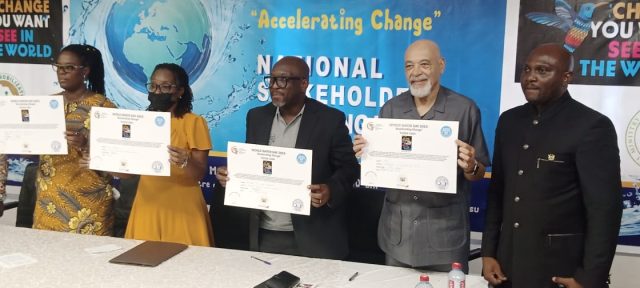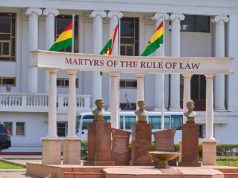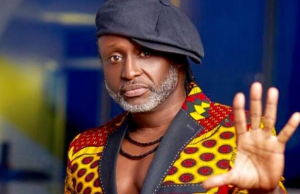Water is life, and its importance cannot be denied. From nutrition to medication, it cuts across several spheres of our existence.
Domestically, the discourse on water protection has been minimal, but now, more crucial than ever, the discourse on water protection needs to be increased, for our own safety, and for posterity.
Small scale illegal gold mining (galamsey) and plastic pollution are the major sources of pollution to our water bodies.
The communication Director of Ghana water company limited Mr. Stanley Martey, has on the backdrop of this, attributed the Illegal mining activities, like sand winning and all other forms of pollution of river bodies as the main cause of high turbidity and
increasing treatment and production costs, and thus the high tariffs.
According to him, Water theft of all forms such as illegal connections of water pipelines and meter by-passes have also been a challenge that contributes to unaccounted water, and hence, reducing sales and revenues.
He charged the community to report people who engage in such illegal activities to any GWCL facility or any Police Station or security agency to deal with that person. Because it can reduce the revenue mobilization.
Mr Martey’s made these assertions at the Revenue Mobilisation Africa (RMA) Press Engagement in Accra, at the Kofi Annan Center of Excellence in ICT, on 22nd March, 2023, dubbed “Accelerating Change”.
Mr. Martey, alluded that the Company had set up a Low-Income Community Support Department with a vision to create a utility in which all city residents, especially the poor, women and girls who lives in low income, informal settlements and slums could enjoy affordable, safe water and hygiene services of high standard.
He said GWCL has implemented several measures to ensure that, the water supplied to Ghanaians meet the highest standards of safety and quality. These include regular testing of water samples to ensure that they meet the World Health Organizations Standards and that of the Ghana Standards Authority.
Saying, “GWCL currently implementing ISO 9001:2015 quality management system which seeks to prioritize customer satisfaction in all aspects of the company’s activities. The GWCL has also subscribed to the International Water Safety Plans which is a Risk Management Tool which looks at safety of water from abstraction to the consumers premises.”
According to him, “Water Safety Plan is a KPI given to GWCL by the regulator, the PURC. GWCL adheres strict to quality control measures to ensure the safety of the water we provide.To fulfill our commitment of delivering safe water, GWCL with the support of Government, has invested close to seven hundred Million USD (USD700M) in nine (9) projects throughout the country in the last 5 years.
Access to potable water in urban areas stands at 93%. This includes all interventions made by stakeholders within the urban water space. National demand for urban water is 321 million gallons per day (MGD) while production is 199 million gallons per day (MGD).”
Mrs. Suzzy Abaidoo, WASH Programme Officer at the Ministry of Sanitation and Water Resources, on her part emphasized that, the Ministry was working tirelessly to ensure that water resources were protected and preserved.
Mrs Abaidoo, continued that the Ministry through one of its implementing measures had collaborated with the Water Resources Commission and developed the buffer zone policy to address human activities which happened close to the banks of water bodies.
According to her, the UN instituted the World Water Day in 1993 to focus attention on the
sustainable use of water resources around the world. Thus, every 22nd March, the World Water Day focuses on a particular theme. This year’s theme ‘Accelerating
Change’ echoes the need to accelerate the required change through partnerships and
cooperation.
She said the Sustainable Development Goal 6 aims at ensuring availability and sustainable management of water and sanitation for all by 2030. This goal is not limited to access to safe and affordable sanitation and drinking water services, but also stresses on the need to protect and preserve the quality and quantity
of our water bodies or water resources for the present and future generations.
For his part, Mr. Geoffrey K Ocansey, the Executive Director of Revenue Mobilization Africa (RMA), indicated that “As a country, we need to work towards our differences. We can have some very good initiatives as in making sure that we will have special funds for water that ensure that we can have increased funding for budgetary allocations to the water sector, then ensure that the market can give us water for free at the point of need.
RMA in collaboration with ministry of Sanitation and Ghana water company limited will ensure every Ghanaian has a potable water. I can assure you that this relationship that we have is basically gearing towards the assurance for every Ghanaian to have access to water. The quality of the water is also very important, and also to protect these water bodies from threats”.
He added that, “there are fishing activities amidst galamsey activities on these same water bodies, passing on poisonous substances their communities. Again, there’s a high cost in treating the contaminated water bodies, and so cost will definitely be passed on to the consumer.
Government will try its best, but we have always said that we need to prioritize and ensure that more funding must go into the essential services, especially water and to the others.”
By:Bernard K Dadzie.


















